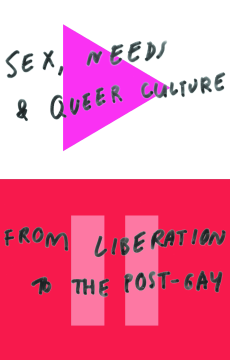
Additional Information
Book Details
Abstract
The belief of many in the early sexual liberation movements was that capitalism’s investment in the norms of the heterosexual family meant that any challenge to them was invariably anti-capitalist. In recent years, however, lesbian and gay subcultures have become increasingly mainstream and commercialized — as seen, for example, in corporate backing for pride events — while the initial radicalism of sexual liberation has given way to relatively conservative goals over marriage and adoption rights. Meanwhile, queer theory has critiqued this ‘homonormativity’, or assimilation, as if some act of betrayal had occurred.
In Sex, Needs and Queer Culture, David Alderson seeks to account for these shifts in both queer movements and the wider society, and argues powerfully for a distinctive theoretical framework. Through a critical reassessment of the work of Herbert Marcuse, as well as the cultural theorists Raymond Williams and Alan Sinfield, Alderson asks whether capitalism is progressive for queers, evaluates the distinctive radicalism of the counterculture as it has mutated into queer, and distinguishes between avant-garde protest and subcultural development. In doing so, the book offers new directions for thinking about sexuality and its relations to the broader project of human liberation.
David Alderson is senior lecturer in modern literature at the University of Manchester and visiting professor at Shanghai Jiao Tong University. He is co-organiser, with Laura Doan, of the Centre for the Study of Sexuality and Culture at Manchester.
'By placing the economic so directly next to the sexual, Sex, Needs and Queer Culture is able to cut through the ideologies of both the academy and the world at large. Alderson's careful eye avoids the excesses of one-sided polemic while remaining firmly critical, and he cleverly and optimistically re-opens the questions of freedom and liberation for an often all-too-cynical age.'
Nina Power, author of One Dimensional Woman
'Honest, thoughtful and continuously insightful, Alderson’s socialist-humanist perspective and commitment to moving beyond the identity politics of recent times makes this an indispensable book’.
Jonathan Dollimore, author of Sex, Literature, and Censorship and Sexual Dissidence
‘A genuinely distinctive, highly considered, and important book. The writing is beautifully articulate, and it offers an ambitious and original contribution to queer theory.’
Stephen Maddison, University of East London
‘Erudite, elegantly written and passionately argued, Sex, Needs and Queer Culture offers a timely and urgently needed reassessment of gay liberation. Alderson’s book will be an enriching and invaluable resource for all working in this field.’
Michael G. Cronin, Maynooth University
‘With nuance, passion and considerable lucidity, David Alderson deftly examines the myths and realities of the one-dimensional gay. Sex, Needs and Queer Culture is an astute analysis of our contemporary moment, and a potent call to both reclaim and reinvigorate subcultural queer praxis.’
Richard Hornsey, University of Nottingham
'Alderson’s overview of queer theory and its relation to resistance, as well as his reading of the work of Marcuse, is thorough, absorbing and readable for an audience beyond queer theory students and academics.'
LSE Review of Books
'The book is marked by an enduring faith in the positive and subversive potential of subcultures, autonomous collectives and anti-consumerist movements.'
Morning Star
'Alderson offers a carefully constructed, critical analysis of contemporary notions of sexual freedom in the historical context of a nascent neoliberal capitalism and era of flexible accumulation.'
Red Pepper
Table of Contents
| Section Title | Page | Action | Price |
|---|---|---|---|
| Cover | cover | ||
| Half title | i | ||
| About the Author | ii | ||
| Title page | iii | ||
| Copyright | iv | ||
| Contents | v | ||
| Acknowledgements | vi | ||
| Introduction | 1 | ||
| 1. Transitions | 34 | ||
| Postmodernity, neoliberalism, hegemony | 34 | ||
| The performance principle | 59 | ||
| The diversified dominant | 83 | ||
| 2. Is Capitalism Progressive (for Queers)? | 94 | ||
| Freedom and commitment | 104 | ||
| Commodification and masculine desire | 112 | ||
| Prefiguration and decadence | 121 | ||
| Neoliberalism, neoconservatism, normativity | 132 | ||
| Sex and the economy of fun | 145 | ||
| 3. Feeling Radical: Versions of Counterculture | 152 | ||
| Radical anger: Tim and Pete | 183 | ||
| The sixties with less hope: Shortbus | 199 | ||
| The revolutionary’s unconscious: The Kiss of the Spiderwoman | 207 | ||
| 4. Subculture and Postgay Dynamics | 224 | ||
| Subcultural materialism | 229 | ||
| Queer as Folk and the urban renewal of subcultures | 237 | ||
| Postgay drama: Mark Ravenhill’s Mother Clap’s Molly House | 253 | ||
| Postscripts | 282 | ||
| New sensations | 282 | ||
| We’re not going shopping? | 291 | ||
| Refusals great and small | 299 | ||
| Index | 302 |
